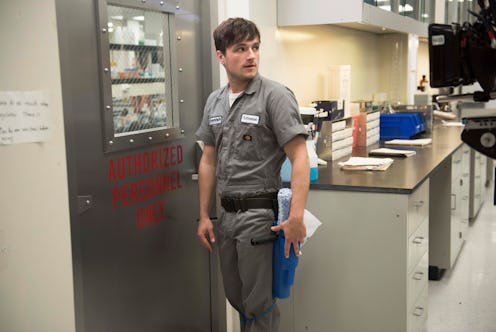Entertainment
How 'Future Man' Is Heavily Inspired By '80s Movies

In Hulu's new original series Future Man, the fate of the human race is in the hands of a janitor working at bioengineering firm Kronish Laboritories, which, he finds out, will unleash a biological catastrophe that makes time travel the only way to preserve the future of the human race. While 2017 has had its fair share of near-apocalyptic sounding headlines, from the permafrost melting to antibiotic resistant bacteria, is Future Man's Kronish Laboratories real? Naturally, in this absurdist action comedy, the company responsible for literally destroying human civilization isn't actually a real company out there attempting to kick off a wild apocalyptic reality by finding a cure for herpes. And its leader, Elias Kronish, doesn't really seem based on any of our current political, business, or scientific leaders — it just seems like a juicy, '80s-inspired part that actor Keith David could really sink his teeth into.
Kronish's mission is actually the most realistic part of Future Man. There are currently some clinical trials in progress that are hoping to treat the herpes simplex virus (which is actually quite common and serious, affecting one in six people in the United States, according to the CDC). More than that, though, this is a very recognizable trope from the type of 1980s media that Future Man is clearly riffing on. In the series trailer Hutcherson calls out that the plot — a lowly nobody recruited to save the world via video game — is literally the plot of The Last Starfighter. In that film, the wold-ending calamity was an intergalactic war with aliens, but here, it seems like the problem will be a biological chaos. (To be fair, it's highly unlikely that curing herpes would actually lead to biological chaos, but this is Future Man's world and we're just living in it.)
The idea of a giant company that unlocks a destructive force that almost ruins civilization is a common trope, as is the single hero who manages to stand up to the machine — sometimes literally — in order to save the day. The biggest reason 1973's Soylent Green is still memorable is because of the revelation that the company that's producing food to feed the would-be starving masses is secretly making their newest product out of... well, to reveal would be a massive spoiler (but one that's become a familiar line) One of the most famous examples is Skynet, the computer network that takes over the planet and decides to exterminate humanity in the Terminator series. Technically, Skynet is the name of the artificial intelligence, while it's Cyberdyne Systems that's the company to blame, but the name Skynet is the iconic name that evokes familiarity for all film fans.
Another famous example is the Weyland-Yutani Company in the Alien franchise, which was sending its mining employees on journeys to track down the dangerous xenomorph. In the film's sequel, Aliens, the company is skeptical about Ellen Ripley's account and continues to pursue the man-eating space beast that incubates inside human bodies, something even the greediest corporate overlords should be able to realize is unwise. And there's plenty more evil corporations in genre films from that era, from Omni Consumer Products, the company that creates Robocop in Robocop, to Blade Runner's Tyrell Corporation, the company that creates humanoid "Replicants" (and if you watch the film or its 2017 sequel, Blade Runner 2049, you'll understand why they're included on this list).
All in all, Future Man is referencing some of the genre greats that it's most inspired by. The company may not be real, but our obsession with how businesses can betray us and go wrong certainly is.